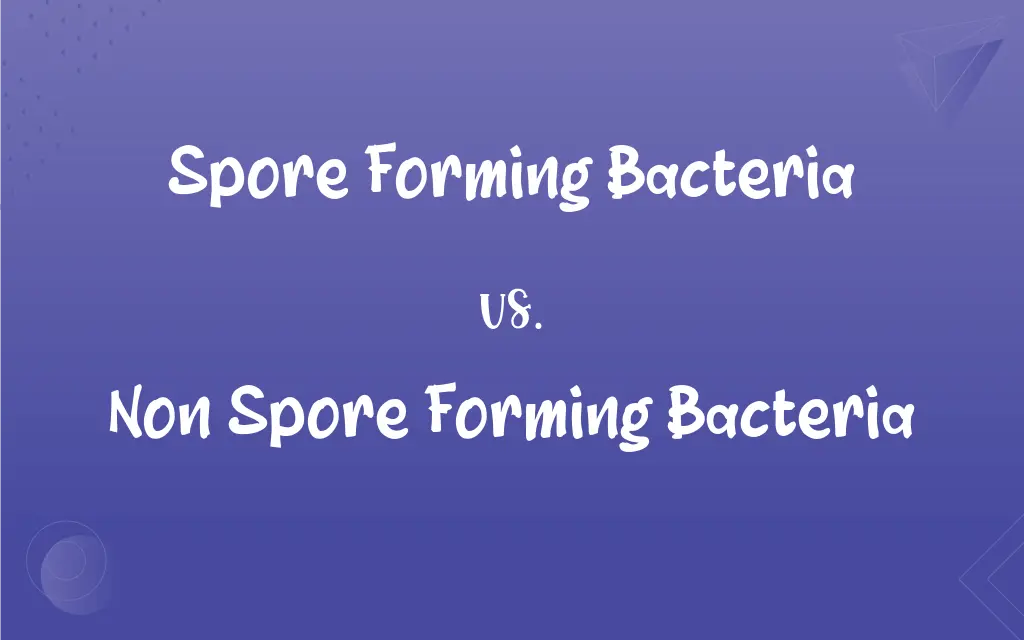Spore Forming Bacteria vs. Non Spore Forming Bacteria: What's the Difference?
Edited by Aimie Carlson || By Harlon Moss || Published on January 11, 2024
Spore-Forming Bacteria can form spores for survival under harsh conditions. Non-Spore-Forming Bacteria cannot form spores; lack this survival mechanism.

Key Differences
Spore-forming bacteria have the ability to produce spores, which are highly resistant structures for surviving adverse conditions. Non-spore-forming bacteria do not have this mechanism and must rely on other survival strategies.
The spores created by spore-forming bacteria are resistant to extreme temperatures, desiccation, and chemicals. In contrast, non-spore-forming bacteria are generally more vulnerable to these environmental stressors.
Common examples of spore-forming bacteria include Bacillus and Clostridium species, known for their resilience. Non-spore-forming bacteria, such as Escherichia coli and Staphylococcus, lack this form of resilience.
In medical and industrial contexts, the resilience of spore-forming bacteria makes them particularly noteworthy, as they can survive sterilization processes. Non-spore-forming bacteria, being less resistant, are easier to manage under these conditions.
The ability to form spores allows spore-forming bacteria to remain dormant for extended periods, reactivating when conditions improve. Non-spore-forming bacteria must continuously find favorable environments to survive.
ADVERTISEMENT
Comparison Chart
Survival Mechanism
Can form resistant spores
Cannot form spores
Environmental Resistance
High resistance to extreme conditions
Generally less resistant
Common Examples
Bacillus, Clostridium
Escherichia coli, Staphylococcus
Resilience in Sterilization
Survive harsh sterilization processes
Less likely to survive sterilization
Dormancy
Capable of extended dormancy in spore form
Require continuous favorable conditions
ADVERTISEMENT
Spore Forming Bacteria and Non Spore Forming Bacteria Definitions
Spore Forming Bacteria
Bacteria known for their ability to withstand sterilization.
Spore-forming bacteria are a concern in sterile medical environments.
Non Spore Forming Bacteria
Microorganisms lacking a spore-based survival mechanism.
Non-spore-forming bacteria are more susceptible to antibiotics than their spore-forming counterparts.
Spore Forming Bacteria
Bacteria with a unique survival mechanism in harsh environments.
These spore-forming bacteria are challenging to eradicate due to their resilience.
Non Spore Forming Bacteria
Organisms that cannot enter a dormant state via spore formation.
Non-spore-forming bacteria must constantly adapt to changing environments.
Spore Forming Bacteria
Organisms forming spores as a response to stress.
When nutrients are scarce, some spore-forming bacteria begin sporulation.
Non Spore Forming Bacteria
Bacteria that rely on immediate environmental conditions for survival.
In adverse conditions, non-spore-forming bacteria may perish quickly.
Spore Forming Bacteria
Microorganisms that can enter a dormant state.
Spore-forming bacteria can survive in extreme conditions for years.
Non Spore Forming Bacteria
Bacteria that cannot produce spores.
Staphylococcus aureus is a non-spore-forming bacterium commonly found on skin.
Spore Forming Bacteria
Bacteria capable of producing resistant spores.
Bacillus anthracis, a spore-forming bacterium, causes anthrax.
Non Spore Forming Bacteria
Bacteria typically more vulnerable to sterilization methods.
Non-spore-forming bacteria are generally easier to eliminate in hospital settings.
FAQs
What defines spore-forming bacteria?
Spore-forming bacteria can produce durable spores as a survival strategy under stress.
Are all bacteria capable of forming spores?
No, only certain bacteria, like Bacillus and Clostridium, have this capability.
Can non-spore-forming bacteria be pathogenic?
Yes, many non-spore-forming bacteria, such as E. coli and Staphylococcus, can cause diseases.
Are spore-forming bacteria always more resistant to antibiotics?
Spore-forming bacteria can be more resistant due to their spores, but this varies among species and conditions.
How do non-spore-forming bacteria survive harsh conditions?
Non-spore-forming bacteria may use other mechanisms like biofilm formation but lack spore-based survival.
How are spores detected in a laboratory?
Spores can be detected using specific staining techniques and microscopic examination.
Why are spore-forming bacteria important in healthcare?
Their ability to survive sterilization makes them a concern for infection control in healthcare settings.
How long can spores remain dormant?
Spores can remain dormant for years, even decades, under the right conditions.
What environmental factors trigger spore formation?
Nutrient depletion, temperature changes, and other stressors can trigger spore formation in these bacteria.
Do non-spore-forming bacteria have any advantages?
They often have faster growth rates and adapt quickly to favorable conditions.
Can spores survive in space?
Some spores have shown remarkable resilience, even in the harsh conditions of space.
What role do non-spore-forming bacteria play in the ecosystem?
They play crucial roles in nutrient cycling, decomposition, and as part of normal flora.
How can spore-forming bacteria be controlled?
Sterilization techniques like autoclaving, and specific disinfectants can control their spread.
Are all spore-forming bacteria harmful?
Not all are harmful; some are used beneficially in agriculture and biotechnology.
How are non-spore-forming bacterial infections treated?
They are generally treated with antibiotics, though resistance is an increasing concern.
Can spores cause infection?
Yes, spores can germinate and cause infection, especially in immunocompromised individuals.
How do non-spore-forming bacteria reproduce?
They typically reproduce by binary fission, similar to spore-forming bacteria.
Are there vaccines against spore-forming bacterial infections?
Yes, for certain diseases like anthrax, caused by spore-forming bacteria, vaccines are available.
Can spores survive boiling water?
Many spores can survive boiling water, requiring higher temperatures for sterilization.
Are spore-forming bacteria used in biotechnology?
Yes, some are used in bioremediation, enzyme production, and as probiotics.
About Author
Written by
Harlon MossHarlon is a seasoned quality moderator and accomplished content writer for Difference Wiki. An alumnus of the prestigious University of California, he earned his degree in Computer Science. Leveraging his academic background, Harlon brings a meticulous and informed perspective to his work, ensuring content accuracy and excellence.
Edited by
Aimie CarlsonAimie Carlson, holding a master's degree in English literature, is a fervent English language enthusiast. She lends her writing talents to Difference Wiki, a prominent website that specializes in comparisons, offering readers insightful analyses that both captivate and inform.






































































